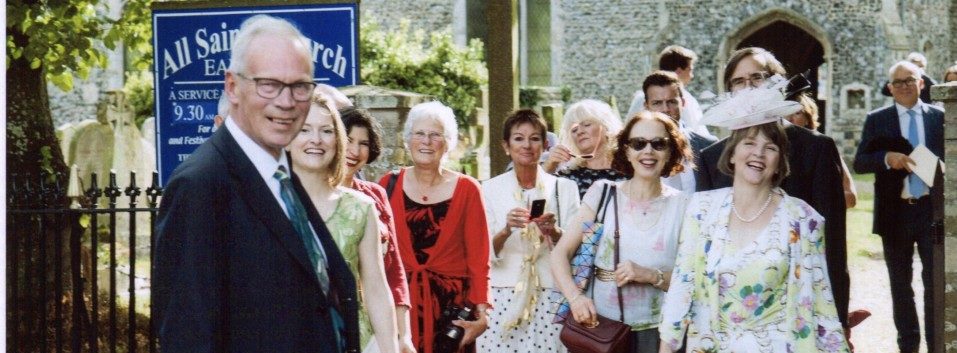I worked in the shop yesterday morning. A man came in and asked where the bananas came from. “Colombia” I said. “A long way to travel” he pointed out. I agreed, but said that they come by boat not plane. Besides, bananas can’t be grown commercially here – they have to cross the ocean, whether from the Americas, Africa or India. He then asked about avocados. And lemons.
As you know, I’m all in favour of eating food in season and grown locally. But really, if you want to eat citrus fruit, you have to accept that it will not be grown here. It is technically possible, but not on a commercial scale and only by using generated heat. What would be green about erecting vast hothouses to grow banana trees, when they can be easily grown in vast quantities in their native (or suitable adopted) environment?
After the man had left (having bought his bananas, as well as English fruit and veg), Al said that most people have little idea about the practicalities of food production. Not long ago, he had a young couple asking for English apples – “why do your apples come from New Zealand, the USA, Chile, South Africa?” Al had to explain that there are no ripe English apples yet and the stored ones have all finished except for the cookers. Another month and the new season apples will be coming in; the Spartan, Discovery and all the other crisp, fresh summer apples – though customers will still not want to wait for October for the Cox’s Orange Pippins to start to ripen and so he will still buy New Zealand Cox’s until then, as well as South African Granny Smith’s and French Golden Delicious.
People still want infinite choice, but they want it locally grown and do not understand about seasons. Nor do they understand about farming.
There has been renewed discussion about the amount of methane produced by cows, and a suggestion that if alternative fodder crops were grown, they might burp and fart less (excuse this rare descent into vulgarity). On the Today programme they had a keen vegetarian in to suggest that we should stop eating beef instead, so that the cattle need not exist to produce all this methane. As usual, the interviewer was hopeless and did not point out any of the flaws in the argument.
I’m not, of course, knocking vegetarianism, nor am I saying one word in favour of intensive animal farming. I’m not saying we need to eat meat. But she was not talking about the ethics of the matter, so that is not the relevant factor here.
She said that you need more land to graze animals than you do to grow crops. This is true, but she was not asked about the land that is not suitable for cultivation. What about the Yorkshire Dales, the Welsh hill farms, the Sussex Downs, Romney Marsh? – all grassland that needs to be grazed and are ideal for sheep. Around here, what about the water meadows and winter-flooded marshes, that are grazed by cows or mown for hay or silage?
Just around my house, there are several fields. One is part of the flood plain. If the river overflows, it floods onto the field and the water can gradually soak in to the ground, helping to top up the underground aquifers from which Norfolk gets its water supply (although this is the area of the country with the lowest rainfall, we have never had a hosepipe ban). If it were ploughed for crops, a drainage system would have to be put in and this water would be channelled away and wasted.
The next field is marked on the Ordnance Survey* maps as Anglo Saxon earthworks. It is ancient grassland and has never been ploughed, although gravel has been extracted in the past. It is full of bumps and hollows and has a wide range of wild flowers and grasses that have taken centuries to establish themselves. It is never artificially fertilised, only by the dung of the cows that graze it. It would not be permitted to plough it up and it would, being light sand over gravel, be poor land anyway.
The next field, though flat, is also sand on gravel. It makes a good hay meadow. It could be ploughed, as the fourth field is, but it is not very fertile and does not hold moisture well. The best way of improving its fertility is by adding whole lots of farmyard manure. Cow muck. Or pig muck. Just like I dig into my vegetable garden. Yes, I make compost, but this improves soil structure more than fertility.
So it’s by no means as simple as all of us converting to vegetarianism even, as she suggested, if it were done over several years. But the thing that I couldn’t believe the interviewer didn’t mention, when all she went on about was not eating beef, was that many, and I should think most, of the cattle are not primarily raised for beef. They are dairy cows.
Now, veganism wasn’t even mentioned. I don’t know if she is vegan. If you are, from planet-saving or animal-welfare motives, a vegetarian, I’m not sure that there is a place for commercial dairy farming. Certainly, for reducing methane production there isn’t. So why didn’t the idiot interviewer (I think I know which one it was, but they are pretty all as bad as each other, so I won’t single one out) even ask whether she thinks we should eat and drink dairy products?
*I had to fill in a form from the Diocese the other day – that’s the Church area administered by the Bishop, of Norwich, in this case. I was amused that they asked for the village church’s Ordinance Survey number.

